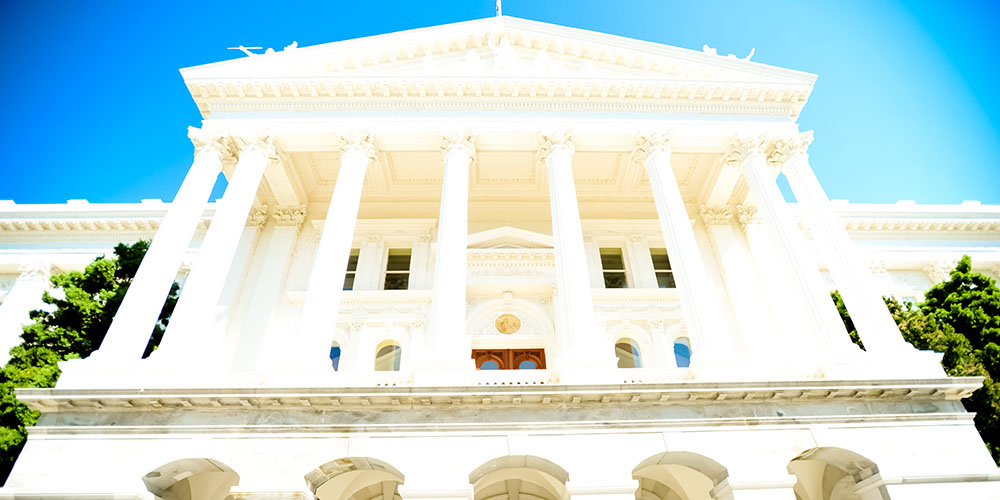
(Photo: Violeta Vaqueiro/CA FWD)
In the closing days of the legislative session, Governor Gavin Newsom signed a number of key bills designed to create a more equitable and resilient state.
Many significant policy proposals were adopted through the state budget this year, with an expansive budget surplus helping to pave the way. The budget of approximately $263 billion included direct financial pandemic relief as well as rent relief for many Californians, universal pre-kindergarten, a major investment package to address wildfire and climate challenges, health insurance for undocumented immigrants 50 years of age and above, and funding for broadband infrastructure and adoption.
During the legislative session, the California Forward Action Fund actively supported several key measures that the Governor ultimately signed. Below is a brief look at the signed bills the Action Fund supported:
Major Investment in Broadband Expansion
Bringing broadband access to those who lack it was an important theme in the Legislature this year. The Governor signed several significant bills that will help close the digital divide. The California Forward Action Fund worked actively in coalition with statewide partners to support their passage.
Through the main budget and companion trailer bill, SB 156, $6 billion was allocated to increase broadband accessibility and affordability. This legislation includes:
- $3.25 billion for the deployment of public open-access middle-mile infrastructure statewide.
- $2 billion for last-mile connections in rural and urban areas
- $50 million for loan-loss reserves for local governments to bond against for broadband deployment (out of a three-year total of $750 million).
- Authority for this funding to support Caltrans in the construction of middle-mile infrastructure on state rights of way, and for technical assistance to local governments seeking to deploy and connect local broadband networks.
AB 14 (Aguiar-Curry)/SB 4 (Gonzalez) are two companion bills dedicated to closing the digital divide. Their adoption supplements the $6 billion investment in broadband infrastructure in SB 156. Together, the two bills will extend an existing surcharge on intrastate telecommunications services to support the work of the California Public Utilities Commission (CPUC) through the California Advanced Services Fund (CASF). The package authorizes the CPUC to increase the surcharge collection cap from $66 million to $150 million per year between January 1, 2022, and December 31, 2032. The surcharge would fund key accounts dedicated to advancing deployment and adoption of broadband services in unserved and underserved communities.
AB 41 (Woods) requires the CPUC to update broadband maps to specified information about local broadband service. It also requires the California Department of Transportation to install conduit for fiber communications lines as part of projects to build a state-owned middle-mile broadband network.
SB 28 (Caballero) requires the CPUC to collect granular data on the actual locations served by the holder of a state cable franchise license, adopt customer service requirements and adjudicate any customer complaints against a state franchise. Additionally, it requires that the CPUC not disclose any personally identifiable information collected pursuant to this bill.
Community Investment
SB 780 (Cortese) makes various changes to Enhanced Infrastructure Financing Districts and Community Revitalization and Investment Authorities (CRIAs) statutes to better facilitate the use of these tools for infrastructure, redevelopment, and affordable housing objectives.
Higher Education
AB 928 (Berman) requires the California State University and University of California to jointly establish a singular lower division general education pathway for transfer admission into both segments. It further requires placing California Community Colleges students who declare their intent to transfer in an associate degree for transfer (ADT) pathway for their intended major and establishes the ADT Intersegmental Implementation Committee to provide oversight.
Wildfires
SB 332 (Dodd) provides that no person shall be liable for any fire suppression or other costs otherwise recoverable for a prescribed burn if specified conditions are met, including that the burn be for the purpose of wildland fire hazard reduction, ecological maintenance and restoration, cultural burning, silviculture, or agriculture, and that, when required, a certified burn boss review and approve a written prescription for the burn. Gross negligence shall not be entitled to such immunity.
Youth
AB 46 (L. Rivas) establishes the California Youth Empowerment Commission, with the goal of providing opportunities for civic engagement to improve the quality of life for California’s disconnected and disadvantaged youth. The bill will be implemented only to the extent it is funded in the Budget Act or if DOF determines sufficient private funding has been provided.
The legislature has adjourned until January 3, 2022, when lawmakers will return to finish the second year of a two-year session.

